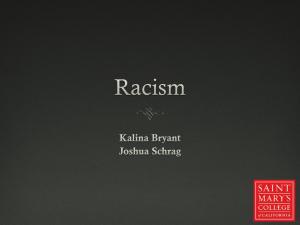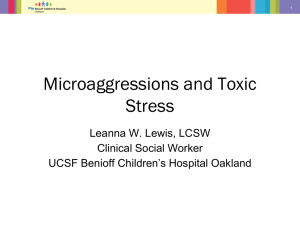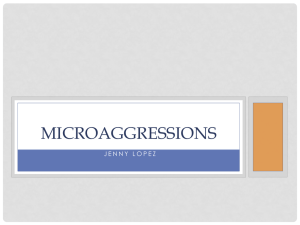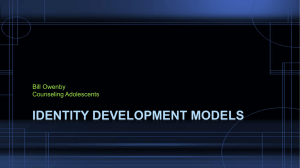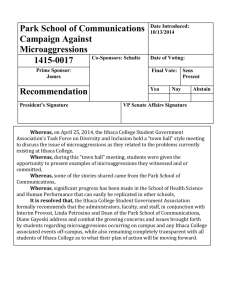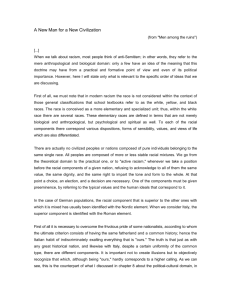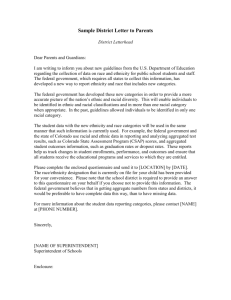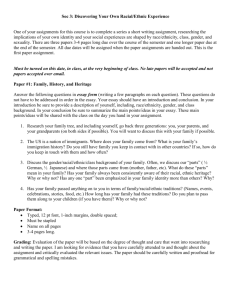A Relational Approach to Racial and Ethnic Microaggressions
advertisement
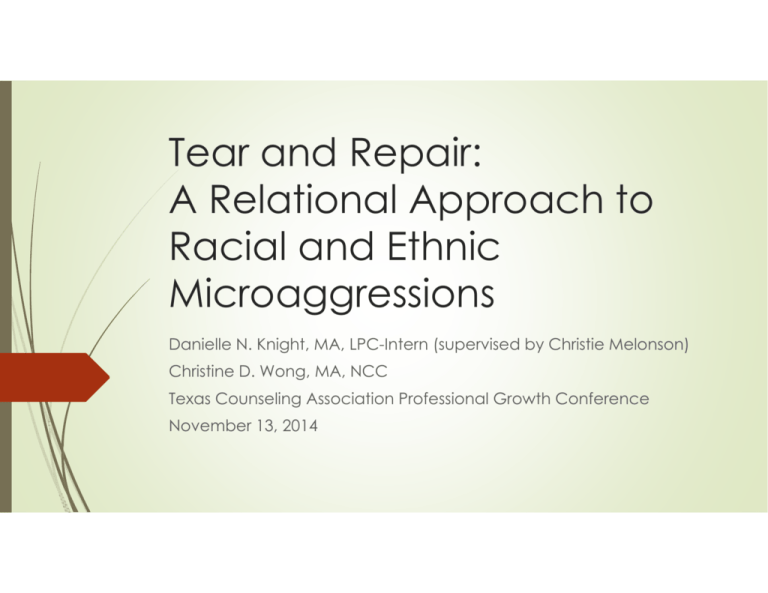
Tear and Repair: A Relational Approach to Racial and Ethnic Microaggressions Danielle N. Knight, MA, LPC-Intern (supervised by Christie Melonson) Christine D. Wong, MA, NCC Texas Counseling Association Professional Growth Conference November 13, 2014 Introductions Who Are We? Danielle Knight Christine Wong Tell us a bit about yourself! Your backgrounds What drew you to this presentation? Purposes/ Goals of Presentation Learn a new way to attend to session that may increase awareness of racial microaggressions Learn a multiculturally-sensitive way to attend to racial microaggressions that occur in session Learning Objectives 1. To educate attendees on various psychological and physical effects of racial and ethnic microaggressions on minority individuals. 2. The impact of racial and ethnic microaggressions on the therapeutic alliance. Learning Objectives (cont’d) 3. To educate attendees on Safran and Muran’s (2000) relational treatment approach and their rupture-resolution models. 4. To describe a multicultural counseling approach to Safran and Muran’s (2000) rupture-resolution models. Learning Objectives (cont’d) 5. To provide attendees with practice recommendations and suggestions utilizing this approach. Overview of Presentation Why it is important to address race and ethnicity in therapy Definitions of race and ethnicity What are microaggressions? How they affect the counseling relationship? Consequences of racial microaggressions? Overview of Presentation (cont’d) What are alliance ruptures? Importance of addressing ruptures in therapy? Alliance-Focused Therapy and Basic Therapist Skills Experiential activities! Why it is important to address race and ethnicity in therapy US is becoming increasingly diverse Racism still exists – just changed forms Minority clients less likely to come to counseling (Owen et al., 2011) Why it is important to address race and ethnicity in therapy (cont’d) Minority clients are more likely to terminate prematurely (Owen et al., 2011) Misdiagnosis of minority clients – colorblindness (Ridley, 1995) Definitions – US Census Bureau Race Reflects a social definition, and not an attempt to define race biologically, anthropologically, or genetically Ethnicity refers to an individual’s self-identification of their origin or descent, “roots,” heritage, or place where the individual or his/her parents or ancestors were born. Definitions – Counseling & Psychology Literature Race Socially constructed only meaningful when understood from social, historical, and political contexts NOT genetically based (Andersen & Collins, 2013) Ethnicity “A group classification of individuals who share a unique social and cultural heritage (customs, language, religion, and so on) passed from one generation to the next” (Richardson et al., 2010, p. 227) Also socially constructed Microaggressions - History Chester Pierce (1977) “Subtle, stunning, often automatic, and nonverbal exchanges which are ‘put downs’ of blacks by offenders” (p. 65) Other terms used to refer to microaggressions Symbolic racism (Sears & McConahay, 1973) Modern racism (McConahay, 1981) Aversive racism (Dovidio et al., 2002) Microaggressions – Definition Sue, Capodilupo, et al. (2007) “Brief and commonplace daily verbal, behavioral and environmental indignities, whether intentional or unintentional, that communicate hostile, derogatory, or negative racial slights and insults to the target person or group” (p. 273). Microaggressions – Types Race Ethnicity Gender Sexual Orientation Consequences of Racial Microaggressions Mental & physical health (Blume et al., 2012; Nadal et al., 2014) Depression Anxiety Stress Emotional & psychological well-being Difficult dialogues on race (Sue et al., 2009) Consequences of Racial Microaggressions (cont’d) In counseling, affects how clients view/rate Working alliance Counselor’s general counseling competence Counselor’s multicultural counseling competence Question to Audience Experience with microaggression based on your race, ethnicity, culture directed at you? In general? During your counselor education? In supervisory relationship? Experience with committing a microaggression? What are Alliance Ruptures? Fluctuations in the quality of the alliance Can be major or minor How they affect the therapeutic alliance Clients rate lower working alliance for unresolved ruptures Successful resolution of ruptures can create an “emotionally corrective experience (Safran & Muran, 2000) Basic Therapist Skills Self-Awareness Affect regulation Interpersonal Sensitivity Awareness Activity 1: Mindfulness Raisin exercise (Segal, Williams & Teasdale, 2013) Intentions for Raisin Exercise (p. 114) 1. Noting the contrast between mindful awareness and automatic pilot 2. Seeing how paying attention in detail can reveal things we had not noticed or had forgotten 3. Paying attention in this way can transform the experience 4. Noticing mind wandering as normal Awareness Activity 1: Mindfulness What was this experience like? Was there any difference between this experience eating a raisin and past experiences? How can this translate into the counseling process? Awareness Activity: Role Plays Way to practice metacommunication 10 min role-plays About 5 min processing each Role Play 1: When Racial Microaggression is NOT addressed Questions to Client Were you aware of the MA? What thoughts/ feelings did you have? Thoughts/feelings you had toward the counselor? Role Play 1 (cont’d) Questions to Counselor Were you aware of any internal and/or external reactions the client had? Was there a shift in the relational dynamic after instigating the microaggression? Role Play 2: When the Racial Microaggression IS addressed Client How did you feel when you brought up that a racial microaggression occurred? Did you feel the RM was “successfully” resolved? How did playing a racially different client help you become more aware of what a client of this background may be thinking or feeling? Role Play 2 (cont’d) Counselor What was it like to have the client bring up the racial microaggression? Were you satisfied with the way you negotiated the racial microaggression? If not, how would you have done it differently? How might being aware of your client’s racial, ethnic, or cultural background help you be more mindful of when a racial microaggression occurs? Final Questions? Thank You! Danielle N. Knight danielleknight541@gmail.com Christine D. Wong christinedwong@gmail.com References Andersen, M. L., & Collins, P. H. (2013). Race, class, and gender: An anthology (8th ed.). Belmont, CA: Wadsworth, Cengage Learning. Blume, A. W., Lovato, L. V., Thyken, B. N., & Denny, N. (2012). The relationship of microaggressions with alcohol use and anxiety among ethnic minority college students in a historically white institution. Cultural Diversity and Ethnic Minority Psychology, 18(1), 45-54. doi: 10.1037/a0025457 Constantine, M. G. (2007). Racial microaggressions against African American clients in cross-racial counseling relationships. Journal of Counseling Psychology, 54(1), 1-16. doi: 10.1037/0022-0167.54.1.1 Dovidio, J. F., Gaertner, S. L., Kawakami, K., & Hodson, G. (2002). Why can’t we just get along? Interpersonal biases and interracial distrust. Cultural Diversity and Ethnic Minority Psychology, 8(2), 88-102. doi: 10.1037//1099-9809.8.2.88 Gaztambide, D. J. (2012). Addressing cultural impasses with rupture resolution strategies: A proposal and recommendations. Professional Psychology: Research and Practice, 43(3), 183-189. doi: 10.1037/a0026911 References (cont’d) Henry, P. J. (2010). Modern racism. In J. M. Levine & M. A. Hogg (Eds.), Encyclopedia of group process & intergroup relations (pp. 576-578). doi: http://dx.doi.org.libweb.lib.utsa.edu/10.4135/9781412972017.n174 McConahay, J. B., Hardee, B. B., & Batts, V. (1981). Has racism declined in America? It depends on who is asking and what is asked. The Journal of Conflict Resolution, 25(4), 563-579. McConahay, J. G., & Hough, J. C. (1976). Symbolic racism. Journal of Social Issues, 32(2), 23-45. Nadal, K. L., Griffin, K. E., Wong, Y., & Hamit, S. (2014). The impact of racial microaggressions on mental health: Counseling implications for clients of color. Journal of Counseling and Development, 92(_), 57-66. doi: 10.1002/j.1556-6676.2014.00130.x Owens, J., Imel, Z., Tao, K. W., Wampold, B., Smith, A., Rodolfa, E. (2011). Cultural ruptures in short-term therapy: Working alliance as a mediator between clients’ perceptions of microaggressions and therapy outcomes. Counselling and Psychotherapy Research, 11(3), 204-212. doi: 10.1080/14733145.2010.491551 References (cont’d) Owen, J., Tao, K. W., Imel, Z. E., Wampold, B. E., & Rodolfa, E. (2014). Addressing racial and ethnic microaggressions in therapy. Professional Psychology Research and Practice, 45(4), 283-290. Pierce, C. M., Carew, J. V., Pierce-Gonzalez, D., & Wills, D. (1977). An experiment in racism: TV commercials. Education and Urban Society, 10(1), 61-87. doi: 10.1177/001312457701000105 Ridley, C. R. (1995). Overcoming unintentional racism in counseling and therapy: A practitioner’s guide to intentional intervention. Thousand Oaks, CA: Sage Publications Safran, J. D., & Muran, J. C. (2000). Negotiating the therapeutic alliance: A relational treatment guide. New York, NY: The Guildford Press. References (cont’d) Sue, D. W., Capodilupo, C. M., Torino, G. C., Bucceri, J. M., Holder, A. M. B., Nadal, K. L., & Esquilin, M. (2007). Racial microaggressions in everyday life: Implications for clinical practice. American Psychologist, 62(4), 271-286. doi: 10.1037/0003-066X.62.4.271 Sue, D. W., Lin, A. I., Torino, G. C., Capodilupo, C. M., & Rivera, D. P. (2009). Racial microaggressions and difficult dialogues on race in the classroom. Cultural Diversity and Ethnic Minority Psychology, 15(2), 183-190. doi: 10.1037/a0014191 U.S. Census Bureau. Race. Retrieved from http://factfinder2.census.gov/help/en/glossary/r/race.htm U.S. Census Bureau. Ethnic origin or race. Retrieved from http://factfinder2.census.gov/help/en/glossary/e/ethnic_origin_or_ race.htm
